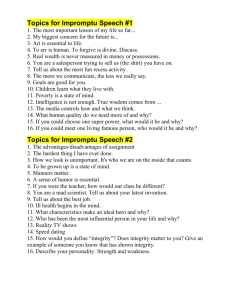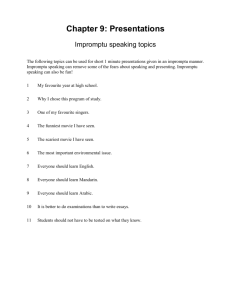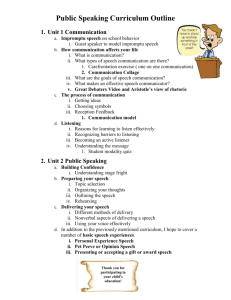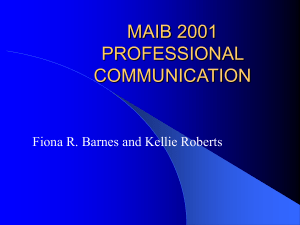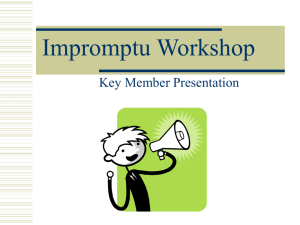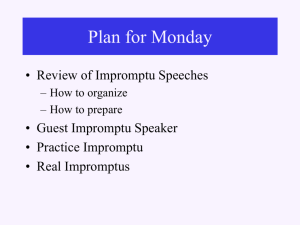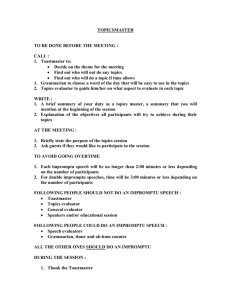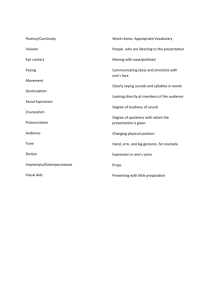Impromptu Speech - oral
advertisement
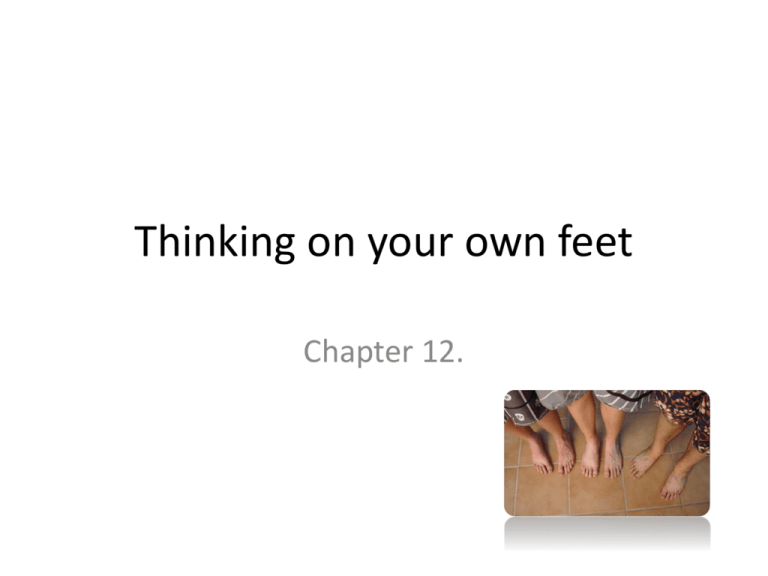
Thinking on your own feet Chapter 12. Thinking on your own feet • Being able to organize one’s own idea quickly & speak about a subject without advance time to prepare. • Impromptu speech. • When do we make impromptu speech? • Key to make impromptu speech: To practice giving extended responses to questions. Respond to Question • (p.210) • Practice giving an answer to a question. • Try to elaborate your response by anticipating what the listener might want to know and providing the information. Impromptu Speech http://www.speech-topics-help.com/impromptu-speech-topics.html http://k6educators.about.com/cs/helpforteachers/a/impromptuspeech.htm http://www.creativekeys.net/PowerfulPresentations/article1015.html Impromptu Speech • An impromptu speech will unnerve even the best public speaker. One of the most daunting experiences a person can face is the request to deliver a speech without notice. http://www.speech-topics-help.com/impromptu-speech-topics.html http://k6educators.about.com/cs/helpforteachers/a/impromptuspeech.htm http://www.creativekeys.net/PowerfulPresentations/article1015.html Preparing for the Impromptu Speech • To be well-informed about news events. • To organize thoughts and opinions quickly and systematically. • To be familiar with different organization patterns. Organizing the Impromptu Speech • Make your speech by following a certain pattern is the easiest and the quickest way for you to respond to any topic spontaneously. • (p.212) • Past-present-future. • Time. • Problem-Solution. • Location. • Cause-Effect or Effect-Cause. • Related Subtopics. • Advantage-Disadvantage . • Speech Topic • INTRODUCTION Specific Purpose Statement: ______________ • BODY – Point 1: _______________________________ Support 1: ____________________________ Support 2: ____________________________ Support 3: ____________________________ Short Summary of point 1: – Point 2: _______________________________ Support 1: ____________________________ Support 2: ____________________________ Support 3: ____________________________ Short Summary of point 2: – Point 3: _______________________________ Support 1: ____________________________ Support 2: ____________________________ Support 3: ____________________________ Short Summary of point 3: • CONCLUSION Summarize why your answer is the best: __________ Questions you may ask… • What to talk about and how? • Any tip to avoid panic and embarrassment? • What if you just draw a blank on the stage? Step 1. • Write down what first comes up in your mind. • A rhetorical question A value A quotation A practical example A solution for a problem A challenge for your class mates • That first idea leads you to a specific speech statement - your thesis - to the point you want to make. Step 2. • Provide two or three points that supports your statement or thesis. • Reasons Facts Statistics Ways how-to-do-it Personal experiences or solutions Step 3. • Provide couples of supports for each point. Two is okay. Three is best • Bottom-line: The supports have to prove the points, and the points have to prove the statement of your impromptu speech topics. Tips to Avoid Panic and Embarrassment • • • • Grab a pen and a piece of paper. Jot down interesting or significant points. Hijack the topic. Begin with your introductory sentence, elaborate, then start working your way to your ending sentence. Complete structure • As you deliver your speech, concentrate on pronunciation and tone. Intelligibility What If You Draw a Blank • Pretend like you're pausing on purpose. – Walk back and forth slowly, as if you're letting your last point sink in. • If you need more time to think, you may want to ask the audience a question. – "Do you have any questions," or "Can everyone hear me okay?" • If you still can't think of what to say, make up a reason to pause the speech. – "I'm sorry, but my throat is very dry. Can I please get a glass of water?” • There is always a joker or popular person who will stand out in the crowd. Stare at someone and try to draw a response from him or her while you think. For your speech… • You will give a 3 minute impromptu speech. • Your topic will be assigned randomly be drawing lots. • You may jot down notes for yourself on a small piece of paper in the 6 minute preparation period, but you may not write out your speech. • You may start with a one sentence attention-getter and move quickly into the main point. You might preview 2 or 3 of your main points. If you wish, you may draw a quick visual aid too. • You would be assigned as an anonymous evaluator for two speakers. You need to provide detailed evaluations (suggestions, comments, critiques) for them, and to score them based on your judgment. • Also, evaluate your own performance.
